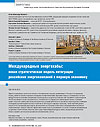International Energy Hubs: New Strategic Model of Integrating Russian Energy Companies in the Global Economy
One of the major goals of political and economic sanctions, imposed on Russia in post-Crimean period, is an attempt of Western geostrategic players to intercept the trade and financial flows between Russia and the countries importing energy and raw resources of Russian or transit origin. These flows are the basis of economic, political and social well-being of Russia. Under extremely severe change of external economic conditions of the Russian energy companies activities an urgent development of a new strategy for their integration into the world economy is required. Such a strategy should be based on the organizational model of the space-stream arrangements and interaction of Russian energy companies, which could be implemented in the most effective way based on the concept of forming energy hubs abroad as a kind of energy infrastructure nodes combining different business profiles of Russian economic agents activities.
References:
- Bortalevich S.I., Loginov E.L., Omarova Z.K. Mul’tiresursnoe upravlenie oborotom toplivno-energeticheskikh resursov v agregirovannykh energoob”edineniyakh [Multi-Resource Control of Fuel and Energy Resources Turnover in Aggregated Energy Associations]. Moscow: Institut problem rynka RAN, 2015, 212 pp.
- Baitov A.V., Loginov E.L. Setetsentricheskoe upravlenie energoinfrastrukturnymi uzlami s klyuchevym polozheniem AES v global’noy energetike [Network-Centric Management of Energy Infrastructure Nodes with a Key Position of Nuclear Power Stations in the Global Power Industry]. Natsional’nye interesy: prioritety i bezopasnost’, 2013, no. 30, pp. 2–10.
- Rossiya ostanavlivaet proekt “Yuzhnyy potok” [Russia Stops “South Stream” Project], available at: http://rbctv.rbc.ru/archive/main_news/text/562949993170619.shtml.
- Moskva i Ankara dvizhutsya v napravlenii realizatsii planov prezidenta Turtsii o sozdanii v etoy strane krupnogo energeticheskogo khaba — Putin [Moscow and Ankara are Moving Towards Implementing the President’s of Turkey Plans to Establish a Major Energy Hub in this Country — Putin], available at: http://interfax.az/view/684502.
- Carvalho R., Buzna L., Bono F., Masera M. et al. (2014) Resilience of Natural Gas Networks during Conflicts, Crises and Disruptions. PLoS ONE 9(3): e90265. doi:10.1371/journal.pone.0090265.
- Tsvetkov V.A., Bortalevich S.I., Loginov E.L. Strategicheskie podkhody k razvitiyu energeticheskoy infrastruktury Rossii v usloviyakh integratsii natsional’nykh energosistem i energorynkov [Strategic Approaches to Developing Russia’s Energy Infrastructure in the Context of National Energy Systems and Energy Markets Integration]. Moscow, IPR RAN, 2014, 511 p.
- Baitov A.V. Transformatsiya organizatsionno-ekonomicheskikh mekhanizmov upravleniya AEPK Rossii v usloviyakh integratsii v global’nuyu energetiku [Transformation of Organizational and Economic Mechanisms of Managing the Nuclear Power Complex of Russia in the Conditions of Integration into the Global Energy Industry]. Moscow: Knizhnyy mir, 2013, 304 pp.
- Loginov E.L., Baitov A.V. Mul’tiagentnoe upravlenie raspredelennym massivom energoinfrastrukturnykh uzlov atomnogo energopromyshlennogo kompleksa Rossii v sisteme transgranichnykh atomno-energopromyshlennykh biznesov [Multi-Agent Management of Distributed Array of Energy Infrastructure Nodes of Russian Nuclear Power Complex in the System of Cross-Border Atomic Power Businesses]. Finansovaya analitika: problemy i resheniya, 2014, no. 14, pp. 2–9.
- Zolotova M. Energeticheskiy khab mezhdu okeanami [Energy Hub Between Oceans], available at: http://www.trud.ru/article/27-05-2016/1337868_energeticheskij_xab_mezhdu_okeanami.html.
- Loginov E.L., Loginov A.E. Konsolidirovannoe energostrategicheskoe upravlenie: klasterizatsiya makroekonomicheskikh yader dinamichnykh massivov dobavlennoy stoimosti rossiyskikh energosyr’evykh vidov ekonomicheskoy deyatel’nosti [Consolidated Energy-Strategic Management: Clustering Macroeconomic Nuclei of Added Value Dynamic Arrays of Russian Energy Reserves Types of Economic Activities]. Finansy i kredit, 2013, no. 3, pp. 47–55.
- Shevchenko I.V. Finansovoe regulirovanie rossiyskoy ekonomiki kak makrokogerentnoy sistemy v usloviyakh nelineynoy ekonomicheskoy dinamiki [Financial Regulation of the Russian Economy as a Macro-coherent System Under Nonlinear Economic Dynamics]. Finansy i kredit, 2013, no. 22, pp. 17–22.
- Ageev A.I. Dinamika i struktura global’nykh riskov [Global Risks Dynamics and Structure]. Strategiya grazhdanskoy zashchity: problemy i issledovaniya, 2013, no. 2, pp. 7–8.
- Khuako Kh.Sh. Razrabotka mekhanizma mul’tiplikatsii investitsionnykh resursov s oporoy na zaemnye sredstva [Developing Mechanism of Investment Resources Multiplication with Reliance on Borrowed Funds]. Ekonomika. Pravo. Pechat’. Vestnik KSEI, 2014, no. 1, pp. 264–269.
- Lukin V.K. Formirovanie vzaimosvyazannogo kompleksa organizatsionnykh instrumentov obsluzhivaniya finansovykh programm [Formation of Interrelated Set of Organizational Tools for Financial Programs Servicing]. Ekonomika. Pravo. Pechat’. Vestnik KSEI, 2013, no. 4, pp. 245–249.
- Ageev A.I. Energetika i silovaya ekonomika: opyt XX veka i perspektivy [Power Engineering and Power Economy: the XX Century Experience and Prospects]. Energeticheskaya politika, 2015, no. 1, pp. 6–12.
- Ageev A., Bol’shakov Z., Met’yuz R. Giperkonkurentsiya [Hypercompetition]. Ekonomicheskie strategii, 2002, no. 4, pp. 36–41



